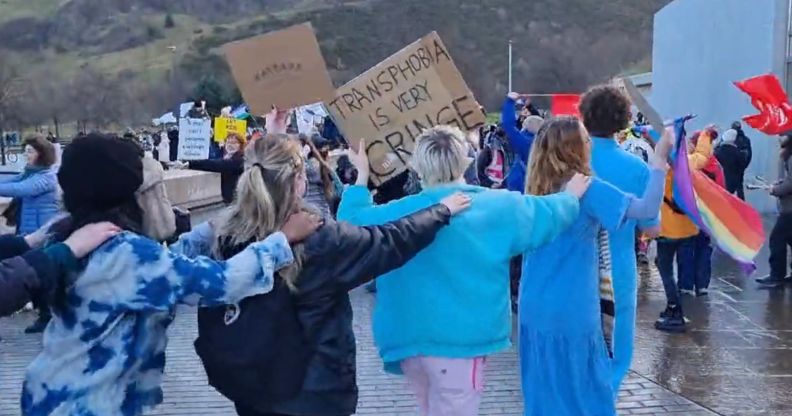Protesters do the Time Warp at Scottish parliament to drown out anti-trans lobby

Counter protesters in support of Scotland’s Gender Recognition Reform bill started a conga line to drown out those against the bill (Photo: Twitter/@GrahamCheckley)
Counter protesters in support of Scotland’s Gender Recognition Reform bill started a conga line to drown out those against the bill (Photo: Twitter/@GrahamCheckley)
Protesters sung, danced and did the conga outside of Holyrood to drown out demonstrations against Scotland’s Gender Recognition Reform Bill.
Hundreds gathered at Scotland’s parliament on Thursday (12 January) as prime minister Rishi Sunak visited for a private meeting with Scotland’s first minister Nicola Sturgeon.
Scotland’s gender law reform was on the agenda, coming after Sunak and his equalities minister, Kemi Badenoch, threatened they could frustrate Holyrood’s Gender Recognition Reform Bill.
Passed in December, the bill would remove barriers for trans people to correct the gender marker on their birth certificate. The UK government has threatened it could stop the bill from receiving royal assent, preventing it from becoming law, or could choose not to recognise Gender Recognition Certificates issued by Scotland.
As crowds gathered at Holyrood against the bill, a counterprotest formed.
One video showed a conga line forming as the group chanted “trans rights are human rights”. Another showed protesters dancing the “Time Warp” from cult classic film The Rocky Horror Picture Show.
Messages on counter protest signs included “transphobia is very cringe” and “trans love trumps ur [your] hate”.
A man named Tom, who helped organise the counterprotest, told The National they were there to “combat and challenge hate and hate speech”. While doing so, the paper reported, they were called “paedophiles” and “child molesters”.
Tom accused the other side of “homophobia under the guise of safeguarding”, as well as spreading “a lot of misinformation and lies”.
One of the protesters against trans rights reform was Niall Fraser of the Scottish Family Party. He told The National that it was writing “fantasy and delusion into law”.
Westminster’s Scottish secretary Alister Jack has said that he would be prepared to block the reform bill from gaining royal assent. He has until 19 January to do so.
Scottish Greens MSP Maggie Chapman has warned that this would trigger a constitutional crisis, and that such a move would almost certainly be challenged in the courts.
Separately, the UK government has announced it is reviewing the list of accepted overseas gender certificates to ensure “the integrity of the [UK] Gender Recognition Act”.
“There are now some countries and territories on the list who have made changes to their systems since then and would not now be considered to have equivalently rigorous systems,” equalities minister Kemi Badenoch wrote in a ministerial statement on Monday (9 January).

